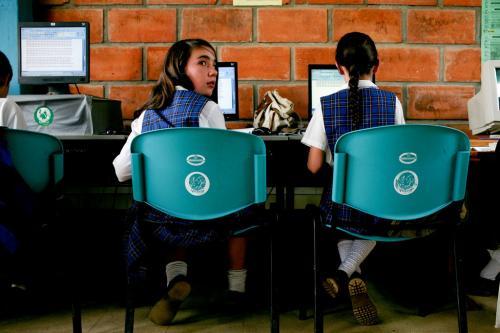Marking Safer Internet Day, UN champions global efforts for child online protection
The United Nations and its partners are celebrating Safer Internet Day with a special focus on education strategies to promote greater online safety for children and young people.

A computer class at San Jose, a rural secondary school in La Ceja del Tambo, Antioquia, Colombia.
“Safer Internet Day is such a great example of how the international community can collaborate in a harmonized way to create a better environment for our children,” said Hamadoun I. Touré, the Secretary-General of the International Telecommunication Union (ITU), the lead UN agency for information and communication technology (ICT).
Under the theme “Creating a better Internet together,” ITU is championing the work of its Child Online Protection initiative, which offers comprehensive sets of guidelines for children, parents, teachers, policy-makers and members of the tech industry.
“ITU has a global reach, but we also understand how important it is to act at the local level within our communities,” Mr. Touré said in a video message for the Day. “Step by step, by empowering and involving children, young people, parents and teachers, we’re striving to educate the next generation on what it means to be a good and responsible global citizen.
“Promoting access to ICT is ITU’s core mandate,” he added. “But at the same time, while fostering greater access to everybody, we recognize the vital need to ensure that ICTs are used in a responsible and safe, especially for our younger generation.”
Research indicates that around half of all European children have online access in their bedrooms, and a quarter of 12-to-15-year-olds now own a tablet, says the Geneva-based ITU. The use of smartphones to send, receive and post photos and videos online is also rising fast. But experts say children’s online safety skills have failed to rise at the same rate as their adoption of new applications and devices.
“Sexting,” bullying, unsolicited explicit content (sex and violence) and sexual approaches from strangers have become routine online dangers modern teenagers face, yet studies show that adults’ knowledge of what young people are doing online is often “vague and complacent,” the agency notes.
Research reveals that while 92 per cent of parents say they have established clear rules for children’s online activity, 34 per cent of children say their parents have not. Also, while 85 per cent of parents surveyed said they knew about parental control software, only 30 per cent had actually installed it.
ITU also points out that, while parents often believe they know enough about the online world to keep their children safe, a 2012 study by Internet security specialist McAfee revealed that four-fifths of teenagers say they know how to hide their online behaviour from parents.
“Generally, restricting children’s Internet access is not the answer: one reason children don’t tell parents about abuse is that the typical reaction of parents is to cut off the child’s Internet connection. This can have the counter-productive effect of making children even more secretive about their online activities,” said Mr. Touré.
Instead, ITU advocates better education in online safety for parents, teachers, and pupils, starting as young as five years old. Among its efforts to mark the Day, ITU is running workshops to help parents understand the risks and learn about tools that can help them keep their children safer.
During the course of the year, the agency also has plans to collaborate with the UN Children’s Fund (UNICEF) and tech industry partners such as Skype in the Classroom to develop educational lessons for children delivered online.
Source: UN News
- 375 reads
Human Rights
Ringing FOWPAL’s Peace Bell for the World:Nobel Peace Prize Laureates’ Visions and Actions

Protecting the World’s Cultural Diversity for a Sustainable Future

The Peace Bell Resonates at the 27th Eurasian Economic Summit

Declaration of World Day of the Power of Hope Endorsed by People in 158 Nations

Puppet Show I International Friendship Day 2020

